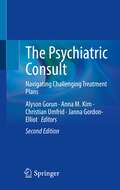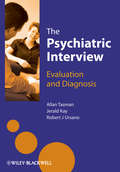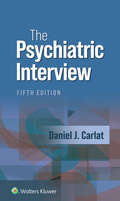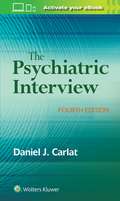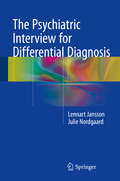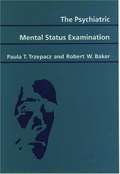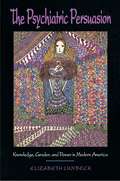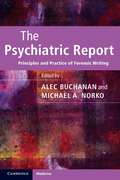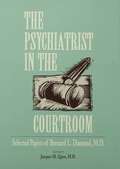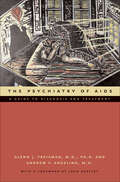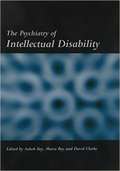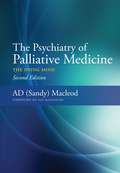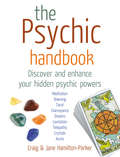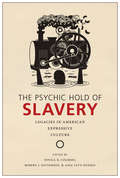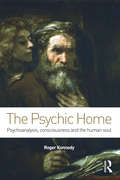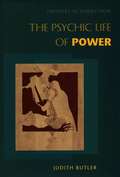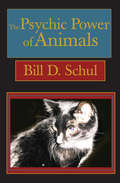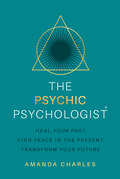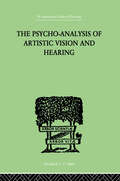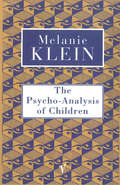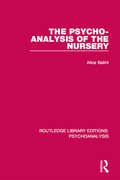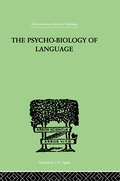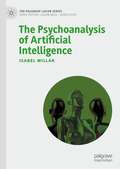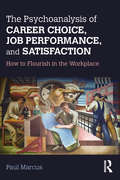- Table View
- List View
The Psychiatric Consult: Navigating Challenging Treatment Plans
by Alyson Gorun Anna M. Kim Christian Umfrid Janna Gordon-ElliotThis book guides psychiatry trainees through some of the most common psychiatric consultation requests in the general medical hospital, using accessible, case-based narratives. Clinical case scenarios are used to demonstrate how to consider both medical and psychological factors involved in the consultation, and the approach to challenging interpersonal dynamics that may occur between the hospitalized patient and the primary medical team. Each case illustrates how to begin to think like a consultation-liaison psychiatrist in order to arrive at a diagnosis and formulate a treatment plan in complex clinical situations. Cases unfold in real time to highlight the critical role of the psychiatrist as liaison to the patient and medical team in order to guide psychiatric management and facilitate effective communication and treatment in the hospital. In addition to clinical cases, each chapter features a concise list of strategies to identify and address patient symptoms and behaviors, interpersonal dynamics, and barriers to care that arise in the hospital. The Psychiatric Consult features resident-specific recommendations and a case-based format that make it a unique, realistic, and engaging learning tool.
The Psychiatric Interview
by Allan Tasman Robert Ursano Jerald KayWhile the ABPN has now supplied such standards for psychiatry, psychiatric interviewing instruction has not been standardized in the US or in other countries. Similarly, the few psychiatric interviewing books available are written in textbook form, often long and often from the subpecialty perspective (e.g. psychodynamic interviewing). Critically, no interviewing guides to date take a true biopsychosocial perspective. That is, they limit themselves to "interviewing" as an isolated technique divorced from full patient assessment, which for quality patient care must include the interface of psychological and social components with biological components. Similarly, few interviewing texts are fully integrated with DSM/ICD categorical diagnostic schemata, even though these descriptive diagnostic systems represent the very core of our clinical language--the lingua franca of the mental health professions. Without good descriptive diagnoses there cannot be adequate communication of clinical data among providers.The proposed book will meet this need for training in biopsychosocial assessment and diagnosis. The patient interview is at the heart of psychiatric practice. Listening and interviewing skills are the primary tools the psychiatrist uses to obtain the information needed to make an accurate diagnosis and then to plan appropriate treatment. The American Board of Psychiatry and Neurology and the Accrediting Council on Graduate Medical Education identify interviewing skills as a core competency for psychiatric residents. The Psychiatric Interview: evaluation and diagnosis is a new and modern approach to this topic that fulfills the need for training in biopsychosocial assessment and diagnosis. It makes use of both classical and new knowledge of psychiatric diagnosis, assessment, treatment planning and doctor-patient collaboration. Written by world leaders in education, the book is based on the acclaimed Psychiatry Third Edition by Tasman, Kay et al, with new chapters to address assessment in special populations and formulation. The psychiatric interview is conceptualized as integrating the patient's experience with psychological, biological, and environmental components of the illness.This is an excellent new text for psychiatry residents at all stages of their training. It is also useful for medical students interested in psychiatry and for practicing psychiatrists who may wish to refresh their interviewing skills.
The Psychiatric Interview
by Daniel J. CarlatFocusing on the practical skills needed to establish rapport with patients and gain valuable clinical insights,The Psychiatric Interview, 5th Edition, offers a practical, concise approach to improving interviewing skills. Noted psychiatrist and award-winning mental health journalist Dr. Daniel J. Carlat uses a proven combination of mnemonics, specific techniques for approaching threatening topics, and phrasing examples to illustrate the nuances of the interviewing process, making this easy-to-digest text essential reading for trainees and practitioners in psychiatry, psychology, nursing, social work, and related fields.
The Psychiatric Interview (Fourth Edition)
by Daniel J. CarlatNow DSM-5 updated! Using a unique and effective combination of mnemonics, practical techniques, and phrasing examples that illustrate the nuances of the interviewing process, The Psychiatric Interview, 4th Edition helps you establish a rapport with patients and gain valuable clinical insights. Now updated to incorporate the DSM-5 and current research, this popular manual teaches you how to improve your interviewing skills, breaking down this complex area into concise information you can put to use immediately in your practice.
The Psychiatric Interview for Differential Diagnosis
by Lennart Jansson Julie NordgaardThis book offers an alternative to operational diagnostic manuals and manuals for structured interviewing as the only sources of theoretical and clinical knowledge. It provides an exposition of psychiatric interviewing that is theoretically and clinically well founded and supplies the reader with a coherent framework for performance of a thorough psychiatric examination. The goal is not to come up with yet another interview scheme but to facilitate an understanding of the basic (but, today, completely neglected) tenets of psychopathology and phenomenology. This exposition targets the disorders of subjectivity (consciousness), the second-person processes involved in converting subjective, first-person and observable data into a third person, diagnostically useful, format. In addition, the most pertinent clinical descriptions concerning the major diagnostic groups are presented and discussed.
The Psychiatric Interview: The Art of Understanding
by Shawn SheaThe 2nd edition of this clinically based guidebook that focuses on the initial psychiatric interview provides practical suggestions for analyzing and altering the interview to mesh with the specific needs of the patient. Contains detailed discussions of how to open an interview, how to interpret nonverbal communication, how to make more natural transitions, and how to arrive at accurate diagnoses. Offers special techniques for eliciting information from depressed, psychotic, and personality-disordered patients. This edition presents updated DSM-IV criteria, new strategies in suicide assessment, and an annotated interview section accompanied by sample write-ups with tips in the appendix.
The Psychiatric Mental Status Examination
by Robert W. Baker Paula T. TrzepaczThis comprehensive text on the Mental Status Examination (MSE)should fill a void in the teaching literature and be useful to both students first learning about the MSE, and seasoned clinicians seeking an advanced reference.
The Psychiatric Persuasion: Knowledge, Gender, and Power in Modern America
by E. LunbeckIn the years between 1900 and 1930, American psychiatrists transformed their profession from a marginal science focused primarily on the care of the mentally ill into a powerful discipline concerned with analyzing the common difficulties of everyday life. How did psychiatrists effect such a dramatic change in their profession's fortunes and aims? Here, Elizabeth Lunbeck examines how psychiatry grew to take the whole world of human endeavor as its object.
The Psychiatric Report: Principles and Practice of Forensic Writing
by Alec Buchanan Michael A. NorkoThe written report is central to the practice of psychiatry in legal settings. It is required of mental health professionals acting as expert witnesses in criminal cases, civil litigation situations, child custody proceedings and risk assessments. This book provides a theoretical background to psychiatric writing for the law and a practical guide to the preparation of the report. The first section addresses practical and ethical concerns, including the conduct of the forensic psychiatric evaluation, conflicts of interest, record keeping and confidentiality. The second section contains practical and detailed advice on preparing various types of report, including reports for use in criminal and civil litigation, civil commitment hearings and child custody proceedings. A final section covers special issues arising during report preparation including the use of psychological tests and the detection of malingering. This is an essential guide for anyone required to write a psychiatric report.
The Psychiatrist in the Courtroom: Selected Papers of Bernard L. Diamond, M.D.
by Bernard L. Diamond Jacques M. QuenOver the course of an illustrious career, the late Bernard Diamond established himself as the preeminent forensic psychiatrist of the century. The Psychiatrist in the Courtroom brings together in a single volume Diamond's pivotal contributions to a variety of important issues, including the nature of diminished capacity, the fallacy of the impartial expert, the predictability of dangerousness, and the unacceptability of hypnotically facilitated memory in courtroom proceedings. Ably introduced and edited by Jacques M. Quen, M.D., a close colleague of Diamond's and leading historian of forensic psychiatry, these writings enable experts and neophytes alike to track Diamond's evolving positions while clarifying where current legal and psychiatric opinion converge -- and diverge -- on a host of critical topics.For the forensic specialist, The Psychiatrist in the Courtroom is not only an invaluable reference work but a compassionate reminder of the clinician's obligation to protect patients in legal proceedings. And in an age when clinicians are increasingly called into court, the book will be no less valuable to psychoanalysts and other mental health professionals eager for an introduction to the intricacies of judicial reasoning. Then, too, owing to Diamond's clinical acumen, the book is a compelling human document. With great erudition and deep compassion, Diamond tackles these and other knotty questions, always with an eye to clarifying the legal and clinical implications of the answers. By combining superb clinical gifts with an incisive understanding of legal principle, Diamond produced a seminal corpus whose relevance to discussions of therapeutic ethics and to legal debates will continue well into the next century.
The Psychiatry of AIDS: A Guide to Diagnosis and Treatment
by Glenn J. Treisman Andrew F. AngelinoHIV/AIDS has become a psychiatric epidemic. The disease causes or exacerbates such psychiatric disorders as depression, dementia, schizophrenia, and bipolar disease. At the same time, the presence of a psychiatric disorder can lead to increased risk for HIV infection and worsen the prognosis of patients once they are infected. Dr. Glenn J. Treisman, who has been described as the "father of AIDS psychiatry," describes the relationship between psychiatric disorders and HIV/AIDS and demonstrates the ways in which effective recognition and treatment of mental disorders can increase a patient's ability to obtain better treatment, improve compliance with medical regimens, and reduce incidents of high-risk behavior.The book provides HIV/AIDS professionals with overviews of psychiatric disorders, including mood and personality disorders, mental retardation, substance abuse and addiction, and sexual disorders and dysfunction. It also provides mental health professionals with essential information on how to care for patients with HIV and those at risk for the infection. The book discusses psychopharmacology, psychotherapy and counseling, as well as adherence and compliance issues, and the relationship between psychiatric disorders and other STDs. Containing the most up-to-date information on diagnosis, prognosis, and treatment, this book draws on the authors' unrivaled experience and uses case studies to show HIV/AIDS professionals how psychiatric interventions benefit the patient, the medical team, and society as a whole. The cases are rich and engaging, and convey to the reader the intense disorder that can affect the lives of patients.
The Psychiatry of Intellectual Disability
by David Clarke Ashok Roy Meera RoyComprehensive concise and easily accessible this is the first health economics dictionary of its kind and is an essential reference tool for everyone involved or interested in healthcare. The modern terminology of health economics and relevant terms used by economists working in the fields of epidemiology public health decision management and policy studies are all clearly explained. Combined with hundreds of key terms the skilful use of examples figures tables and a simple cross-referencing system between definitions allows the often complex language of health economics to be demystified.
The Psychiatry of Palliative Medicine: The Dying Mind
by Sandy MacLeodThis Second Edition of The Psychiatry of Palliative Medicine remains a practical and pragmatic distillation of the psychiatry relevant to the terminally ill. Revised throughout and greatly expanded by the addition of two entirely new chapters, it reviews the major psychiatric syndromes encountered in palliative care - depression, anxiety, delirium - and examines psychopharmacological and psychological interventions in detail. It succinctly considers the psychiatric aspects of pain, sleep, cognitive impairment, terminal neurodegenerative diseases, sedation, artificial feeding and euthanasia. The dying, chronically ill psychiatric patient is also discussed. The author has drawn on his great experience in both consultation-liaison psychiatry and palliative medicine to produce an essential, evidence-based guide for all healthcare professionals involved in palliative care. These include consultants and senior nurses, as well as psychiatrists, especially consultation-liaison psychiatrists, and trainees. 'I find this an immensely sympathetic book, beautifully written. It is a testimony to the summation of specialist psychiatric knowledge, broad scholarship and a rich personal practice in bedside palliation.' From the Foreword by Ian Maddocks Reviews of the first edition: '...a relevant, highly readable and reasonably priced book which will be of interest to all, whether from a psychiatric or palliative care background, who seek to improve the care of dying patients INTERNATIONAL PSYCHOGERIATRICS 'Practical, scientifically based and scholarly, addressing a comprehensive set of common and important clinical problems in palliative care. The book will doubtlessly be highly valued by palliative care clinicians for its practical and thorough overview of some of the most challenging clinical problems they face. Excellent and timely.' AUSTRALIAN AND NEW ZEALAND JOURNAL OF PSYCHIATRY
The Psychic Handbook: Discover and Enhance Your Hidden Psychic Powers
by Craig Hamilton-ParkerMost of us have had psychic experiences at one time or another; we may find a new place strangely familiar, finish other people's sentences or sense a definite positive or negative feeling about a house. Almost everyone has some latent psychic ability. The Psychic Handbook provides a fun, entertaining way to develop your psychic power. Craig Hamilton-Parker takes you step-by-step through skills such as mediumship, prophesy, psychometry, dream analysis, dowsing, numerology and clairvoyance. He also shows how you can learn to meditate in order to liberate the intuition that is the basis of all psychic ability, and find out about crystals and how they can have a beneficial effect on your life.Packed with information, experiments and games, including special cards developed by scientists to test your telepathic skills, The Psychic Handbook will show how you can explore an undiscovered part of your personality and unlock your psychic potential.
The Psychic Hold of Slavery: Legacies in American Expressive Culture
by Robert J. Patterson Margo Natalie Crawford Brandon J. Manning Aida Levy-Hussen Régine Michelle Jean-Charles Calvin Warren Soyica Diggs Colbert Michael Chaney Douglas A. Jones Jr. Gershun AvilezWhat would it mean to "get over slavery"? Is such a thing possible? Is it even desirable? Should we perceive the psychic hold of slavery as a set of mental manacles that hold us back from imagining a postracist America? Or could the psychic hold of slavery be understood as a tool, helping us get a grip on the systemic racial inequalities and restricted liberties that persist in the present day? Featuring original essays from an array of established and emerging scholars in the interdisciplinary field of African American studies, The Psychic Hold of Slavery offers a nuanced dialogue upon these questions. With a painful awareness that our understanding of the past informs our understanding of the present--and vice versa--the contributors place slavery's historical legacies in conversation with twenty-first-century manifestations of antiblack violence, dehumanization, and social death. Through an exploration of film, drama, fiction, performance art, graphic novels, and philosophical discourse, this volume considers how artists grapple with questions of representation, as they ask whether slavery can ever be accurately depicted, trace the scars that slavery has left on a traumatized body politic, or debate how to best convey that black lives matter. The Psychic Hold of Slavery thus raises provocative questions about how we behold the historically distinct event of African diasporic enslavement and how we might hold off the transhistorical force of antiblack domination.
The Psychic Home: Psychoanalysis, consciousness and the human soul
by Roger KennedyThe Psychic Home: Psychoanalysis of Consciousness and the Human Soul develops, from a number of different viewpoints, the significance of home in our lives. Roger Kennedy puts forward the central role of what he has termed a ‘psychic home’ as a vital psychic structure, which gathers together a number of different human functions. Kennedy questions what we mean by the powerfully evocative notion of the human soul, which has important links to the notion of home and he suggests that what makes us human is that we allow a home for the soul. As an illustration of this concept he explores how it can help to understand a vital element of William Wordsworth’s development as a poet. The word soul is both abstract and yet also powerfully emotive. Kennedy shows that it can be approached from a number of different angles, from psychoanalysis, philosophy, religion, sociology, literature and neuroscience. The Psychic Home, discusses the mysteries and complexities of the soul, and aims to evoke some restoration of its place in our thinking. It illustrates how the word soul and similar key words, such as spirit and inwardness, express so much that is essential for humans, even if we cannot be too precise about their meanings. Insightful, enlightening and broad reaching, The Psychic Home brings the concept of the soul centre stage as an entity that is elemental, an essence, irreducible, and what makes us human as subjects of experience. It will be essential reading for psychoanalysts, psychotherapists, neuroscientists, philosophers and those interested in spirituality and religion.
The Psychic Life of Power: Theories in Subjection
by Judith ButlerAs a form of power, subjection is paradoxical. <P><P>To be dominated by a power external to oneself is a familiar and agonizing form power takes. To find, however, that what "one" is, one's very formation as a subject, is dependent upon that very power is quite another. <P><P>If, following Foucault, we understand power as forming the subject as well, it provides the very condition of its existence and the trajectory of its desire. <P><P>Power is not simply what we depend on for our existence but that which forms reflexivity as well. Drawing upon Hegel, Nietzsche, Freud, Foucault, and Althusser, this challenging and lucid work offers a theory of subject formation that illuminates as ambivalent the psychic effects of social power.
The Psychic Power of Animals
by Bill D. SchulDiscover the incredible psychic abilities of cats, dogs, horses, canaries, and more in this revelatory book from an expert of interspecies communication. Pets are more than companions. The animals we share our lives with are channels to another world. Documentation exists that proves animals do indeed possess a sixth sense. Discover the mysterious and fantastic revelations about dogs who trace their masters across vast distances; dogs who read minds; dolphins as super beings; conversations between people and animals; the strange friendship between Native Americans and rattlesnakes; animals who reside in pyramids; the German shepherd who taught meditation; the amazing ability of animals to think and reason; and much more that will forever change the way you look at animals.
The Psychic Psychologist: Heal Your Past, Find Peace in the Present, Transform Your Future
by Amanda CharlesDo you feel like your life looks perfect from the outside, but on the inside you&’re falling apart? Have you gone from one practitioner to the next desperately seeking solutions and yet still suffer? If the answer&’s &‘yes&’, then you need The Psychic Psychologist®.Combining traditional psychology, energy work and quantum theory, as well as professional and life experience, The Psychic Psychologist offers a completely unique perspective on healing.With evidence-backed psychological interventions alongside spiritual and intuitive practices, The Psychic Psychologist will help you break free from suffering, transform your pain and go beyond all limitations to create the life you desire. It&’s a book that will help you tap more deeply into your higher power and follow your inner voice, so you can embrace a new reality and consciously construct positive change in your present and for your future.So, no matter how many times life has kicked you when you&’re down, this book will show you that when you&’re fully connected to all the layers of your existence – body, heart, mind and soul – you can turn your pain into purpose and live a life you love.&‘I always hoped that someone would bring a totally new perspective to the way we view human consciousness. Amanda has absolutely done that with this wonderful book.&’Gordon Smith, internationally renowned medium, spiritual teacher and bestselling author.
The Psycho-Analysis Of Artistic Vision And Hearing: An Introduction to a Theory of Unconscious Perception (International Library Of Psychology Ser. #Vol. 38)
by Ehrenzweig, AntonThis book deals with the inarticulate form elements hidden in the unconscious structure of a work of art or—what comes to the same thing — with the unconscious structure of the perception processes by which we actively create or passively enjoy these unconscious form elements. In order to become aware of inarticulate forms we have to adopt a mental attitude not dissimilar to that which the psycho-analyst must adopt when dealing with unconscious material, namely some kind of diffuse attention.
The Psycho-Analysis of Children: The Conduct Of The Psycho-analysis Of Children As Seen In The Treatment Of A Ten Year Old Boy
by Melanie KleinThe Psycho-Analysis of Children, first published in 1932, is a classic in its subject, and revolutionised child analysis. Melanie Klein had already proved, by the special technique she devised, that she was a pioneer in that branch of analysis. She made possible the extension of psycho-analysis to the field of early childhood, and in this way not only made the treatment of young children possible but also threw new light on psychological development in childhood and on the roots of adult neuroses and psychoses.
The Psycho-Analysis of the Nursery: Analysis Of The Nursery (Routledge Library Editions: Psychoanalysis)
by Alice BalintOriginally published in English in 1953, this title was first printed in Hungarian in 1931. Already translated into German, French and Spanish, Alice Balint (the first wife of Michael Balint) had intended to translate the title into English herself, but died suddenly at the beginning of the Second World War. Eventually their son, by this time a qualified doctor, was instrumental in bringing this edition about.
The Psycho-Biology Of Language: AN INTRODUCTION TO DYNAMIC PHILOLOGY (International Library Of Psychology Ser.)
by George Kingsley ZipfThis is Volume XXI in a series of twenty-one on the Cognitive Psychology. Orignally published in 1936, this is a study on the introduction to Dynamic Philology.
The Psychoanalysis of Artificial Intelligence (The Palgrave Lacan Series)
by Isabel MillarThis book examines the crucial role of psychoanalysis in understanding what AI means for us as speaking, sexed subjects. Drawing on Lacanian theory and recent clinical developments it explores what philosophy and critical theory of AI has hitherto neglected: enjoyment. Through the reconceptualization of Intelligence, the Artificial Object and the Sexual Abyss the book outlines the Sexbot as a figure who exists on the boundary of psychoanalysis and AI. Through this figure and the medium of film, the author subverts Kant’s three Enlightenment questions and guides readers to transition from asking 'Does it think?' to 'Can it enjoy?' The book will appeal in particular to students and scholars of psychoanalysis, philosophy, film and media studies, critical theory, feminist theory and AI research.
The Psychoanalysis of Career Choice, Job Performance, and Satisfaction: How to Flourish in the Workplace
by Paul MarcusFreud said that "love and work" are the central therapeutic goals of psychoanalysis; the twin pillars for a sound mind and for living the "good life." While psychoanalysis has masterfully contributed to understanding the experience of love, it has only made a modest contribution to understanding the psychology of work. This book is the first to explore fully the psychoanalysis of work, analysing career choice, job performance and job satisfaction, with an eye toward helping people make wiser choices that bring out the best in themselves, their colleagues and their organization. The book addresses the crucial questions concerning work: how does one choose the right career; what qualities contribute to excellence in performance; how best to implement and cope with organizational change; and what capacity and skills does one need to enjoy every day work? Drawing on psychoanalytic thinking, vocational counseling, organizational psychology and business studies, The Psychoanalysis of Career Choice, Job Performance, and Satisfaction will be invaluable in clinical psychoanalytic work, as well as for mental health professionals, scholars, career counselors and psychologists looking for a deeper understanding of work-based issues.
